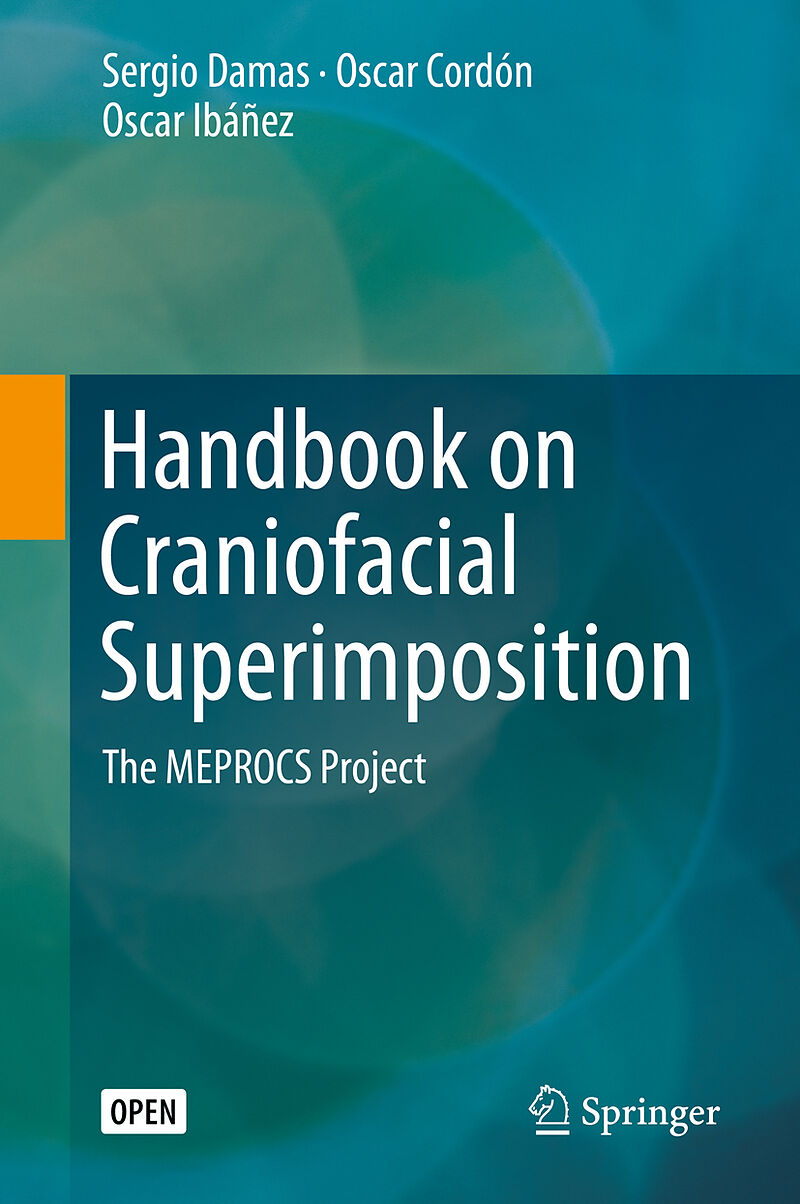Handbook on Craniofacial Superimposition
Einband:
Fester Einband
EAN:
9783319111360
Untertitel:
The MEPROCS Project
Genre:
Anwendungs-Software
Autor:
Sergio Damas, Oscar Ibáñez, Oscar Cordón
Herausgeber:
Springer International Publishing
Auflage:
1st ed. 2020
Anzahl Seiten:
248
Erscheinungsdatum:
14.11.2019
ISBN:
3319111361
Authors among leading researchers and practitioners worldwide Reports successful collaborative project results First comprehensive guide on this important technique Open Access
Authors among leading researchers and practitioners worldwide Reports successful collaborative project results First comprehensive guide on this important technique Includes supplementary material: sn.pub/extras
Autorentext
Prof. Sergio Damas received his PhD in Computer Science from the University of Granada, Spain, where he is now a Full Professor. He was Deputy Principal Researcher (2006-2011) and Principal Researcher (2011-2016) at the European Centre for Soft Computing. He has published 150+ scientific publications (including 40+ JCR-SCI indexed journal papers). Prof. Damas has supervised seven PhD dissertations; one of them received the Best PhD Thesis Award from the European Society for Fuzzy Logic and Technology (EUSFLAT). He owns an international patent on an intelligent system to perform craniofacial superimposition ID using Soft Computing; the corresponding software is currently commercialized by Panacea Cooperative Research. And he received the Outstanding Applications of Fuzzy Technology award from the International Fuzzy Systems Association (IFSA). Prof. Damas has also coordinated 30+ research project and contracts. In particular, he was the global coordinator of the New Methodologies and Protocols of Forensic Identification by Craniofacial Superimposition (MEPROCS) European project.
Prof. Oscar Cordón received his PhD in Computer Science from the University of Granada, Spain, where he is now a Full Professor. He was a founding researcher of the European Centre for Soft Computing (2006-2015). He was awarded the IEEE CIS Outstanding Early Career Award (2011) and the Spanish National Award on Computer Science ARITMEL (2014), and in 2018 he became an IEEE Fellow. He has published 360+ scientific publications (including 100 JCR-SCI-indexed journal papers), and he has advised 18 Ph.D. dissertations, one of which received the Best PhD Thesis Award from the European Society for Fuzzy Logic and Technology (EUSFLAT). Prof. Cordón has coordinated 31 research projects and contracts. He owns an international patent on an intelligent system to perform craniofacial superimposition ID using Soft Computing; the corresponding software is currently commercialized by Panacea Cooperative Research. And he received the Outstanding Applications of Fuzzy Technology award from the International Fuzzy Systems Association (IFSA). He is also included in the top 1% most-cited researchers in the world according to the Web of Knowledge.
Dr. Oscar Ibáñez is CTO at Panacea Cooperative Research. He studied in five different universities, and he has done research in eight different labs. He has coauthored two patents, 29 SCI-JCR indexed journal papers, and 30+ papers in conferences in collaboration with 70 researchers from 32 different research institutions dealing with different research fields: computer vision, medical imaging, soft computing, forensic anthropology, neurology, and ocean engineering. He has participated in four European and nine Spanish research projects. He has received several national and international awards and recognitions: the postdoctoral grants Juan de la Cierva and Juan de la Cierva Incorporación, theBest Paper Award from the IEEE Computational Intelligence Magazine, the Best PhD Thesis Award from the European Society for Fuzzy Logic and Technology (EUSFLAT), and also the Award for Outstanding Applications of Fuzzy Technology from the International Fuzzy Systems Association (IFSA).
Klappentext
This open access book is the first comprehensive guide to a new soft computing technique which is used in complex forensic cases. The chapters include detailed technical and practical overviews, and discussions about the latest tools, open problems and ethical and legal issues involved. The book will be of interest to researchers and practitioners in forensic medicine and computational intelligence.The book is closely associated with a successful research initiative, MEPROCS (New Methodologies and Protocols of Forensic Identification by Craniofacial Superimposition). The project collaborators were: S. Damas, O. Ibáñez, M.I. Huete, T. Kahana, C. Wilkinson, E. Ferguson, C. Erolin, P.T. Jayaprakash, R. Jankauskas, F. Cavalli, K. Imaizumi, R. Vicente, D. Navega, E. Cunha, A.H. Ross, E. Veselovskaya, A. Abramov, P. Lestón, F. Molinero, E. Ruiz, F. Navarro, J. Cardoso, F. Viegas, D. Humpire, R. Hardiman, J. Clement, A. Valsecchi, B.R. Campomanes-Alvarez, C. Campomanes-Alvarez, A.S.Çadr, T. Briers, M. Steyn, M. Viniero, D.N. Vieira, and O. Cordón.
Inhalt
Introduction to Craniofacial Superimposition.- Importance of Craniofacial Superimposition in Forensic Identification: Historical Perspective.- Relationships Between the Skull and the Face in the Forensic Realm.- Craniofacial Superimposition Techniques.- Craniofacial Superimposition: The State of the Art.- Ethical and Legal Issues in Craniofacial Superimposition.- Experimental Study of Methodologies, Tools and Criteria.- MEPROCS Craniofacial Superimposition Framework.- MEPROCS Framework Validation.- Conclusions.- Appendices.- References.

Leider konnten wir für diesen Artikel keine Preise ermitteln ...
billigbuch.ch sucht jetzt für Sie die besten Angebote ...
Die aktuellen Verkaufspreise von 6 Onlineshops werden in Realtime abgefragt.
Sie können das gewünschte Produkt anschliessend direkt beim Anbieter Ihrer Wahl bestellen.
Loading...
Die aktuellen Verkaufspreise von 6 Onlineshops werden in Realtime abgefragt.
Sie können das gewünschte Produkt anschliessend direkt beim Anbieter Ihrer Wahl bestellen.
| # | Onlineshop | Preis CHF | Versand CHF | Total CHF | ||
|---|---|---|---|---|---|---|
| 1 | Seller | 0.00 | 0.00 | 0.00 |
